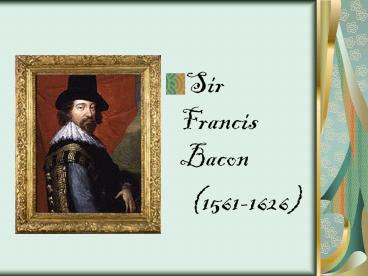Bacon - PowerPoint PPT Presentation
Title: Bacon
1
- Sir Francis Bacon
- (1561-1626)
2
Sir Francis Bacon
- Born 22 January 1561
- London, England
- Died 9 April 1626 (aged 65)Highgate,
EnglandEra Renaissance philosophy - Region Western philosophy
- School Empiricism
- Signature
3
Early Life
- Bacon,the son of Nicholas Bacon,was educated at
home in his early years owing to poor health
receiving tuition from John Walsall, a graduate
of Oxford with a strong leaning towards
Puritanism. - He entered Trinity College,Cambridge, on 5 April
1573 at the of 12.He was also educated at the
University of Poitiers.It was at Cambridge that
he firs met Qeen Elizabet,who was impressed by
his precocious intellect,and was accustomed to
calling him the young Lord Keeper - On 27 June he entered On 27 June 1576 he and
Anthony entered de societate magistrorum at
Gray's Inn. A few months later, Francis went
abroad with Sir Amias Paulet. - For the next three years he visited Blois,
Poitiers, Tours, Italy, and Spain. During his
travels, Bacon studied language, statecraft, and
civil law while performing routine diplomatic
tasks. On at least one occasion he delivered
diplomatic letters to England for Walsingham,
Burghley, and Leicester, as well as for the
queen.
4
Trinity College,Great Court with fountain.
Trinity
College, Great Court with fountain
5
- From 1584 to 1617 (the year he entered the House
of Lords) he was an active member in the Commons.
- When he lost Elizabeth's favor over the subsidy
affair of 1593, Bacon turned to the Earl of Essex
as a patron. He served Essex as political
advisor, but distanced himself from him when
Essex's failure in the Irish campaign became
evident and when his rebellion against the Queen
finally brought him to the executioner's block. - When in 1603 the Scottish king James VI succeeded
the great Queen as James I of England, Bacon's
time had come at last. He was knighted in 1603,
married a young and rich heiress in 1606, was
appointed Solicitor General in 1607 and Attorney
General in 1613. - In 1616 he became a member of the Privy Council
and was granted the title of Lord Chancellor and
created Baron of Verulam in 1618. - When Bacon was created Viscount of St. Albans,
he was impeached by Parliament for corruption in
his office as a judge. His fall was contrived by
his adversaries in Parliament and by the court
faction. He lost all his offices and his seat in
Parliament, but retained his titles and his
personal property.
6
Death
- On 9 April 1626 Bacon died while at Arundel
mansion at Highgate outside London of pneumonia.
An influential account of the circumstances of
his death was given by John Aubrey. - Some people, including Aubrey, consider these two
contiguous, possibly coincidental events as
related and causative of his death "The Snow so
chilled him that he immediately fell so extremely
ill, that he could not return to his Lodging ...
but went to the Earle of Arundel's house at
Highgate, where they put him into ... a damp bed
that had not been layn-in ... which gave him such
a cold that in 2 or 3 days as I remember Mr
Hobbes told me, he died of Suffocation." - At his funeral, over thirty great minds collected
together their eulogies of him, which was then
later published in latin.
7
- Memorial to Francis Bacon, in the chapel of
Trinity College, Cambridge
8
Baconian Method
- The Novum Organum is a philosophical work by
Francis Bacon published in 1620. The title is a
reference to Aristotle's work Organon, which was
his treatise on logic and syllogism. In Novum
Organum, Bacon detailed a new system of logic he
believed to be superior to the old ways of
syllogism. In this work, we see the development
of the Baconian method, consisting of procedures
for isolating the form, nature or cause of a
phenomenon, employing the method of agreement,
method of difference, and method of concomitant
variation devised by Avicenna in 1025.
9
- Essay (1597)
- The Elements of the Common Law of England
(1597)(aka Maxims of the Law) - Sir Francis Bacon His Apology, in Certain
ImputationsConcerning the Late Earl of Essex
(1604) - Valerius Terminus of the Interpretation of
Nature (wr.1604)
- De sapientia veterum liber (1609)
- Novum Organum (1620)
- The History of the Reign of King Henry the
Seventh (1622) - The Translation of Certain Psalms (1625)
10
Sir Francis Bacon is often cited as a possible
author of Shakespeare's plays.
- The Baconians, hold that scholars are so focused
on the details of Shakespeare's life that they
neglect to investigate the many facts that they
see as connecting Bacon to the Shakespearean
work.
11
Sir Francis Bacon's letter to John Davies, "so
desiring you to be good to concealed poets."
12
"Truth can never be reached by just listening to
the voice of an authority."
"But when I searched, I found no work so
meritorious as the discovery and development of
the arts and inventions that tend to civilise the
life of man."
"That extra-ordinary genius, when it was
impossible to write a history of what was known,
wrote one of what it was necessary to learn."































